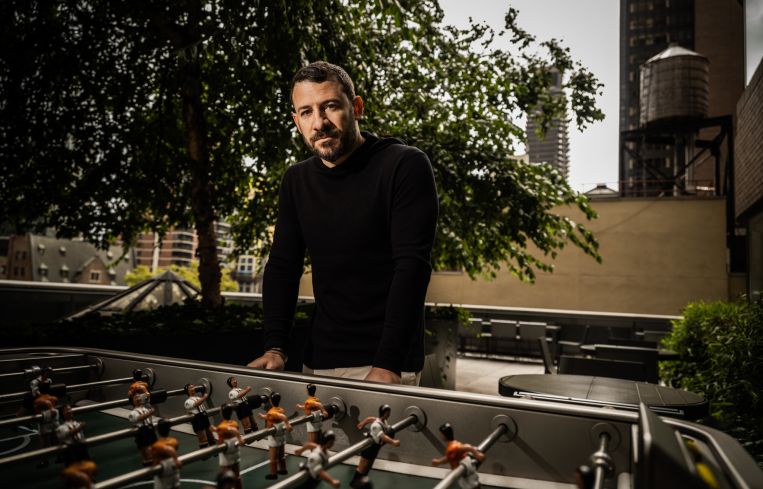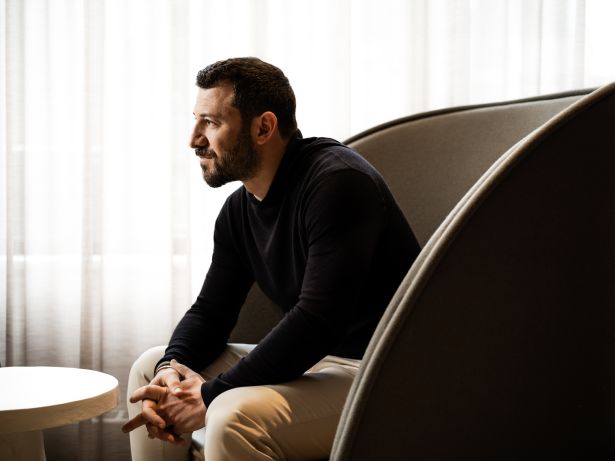Sage Realty’s Jonathan Kaufman Iger Wants to Build an Office Brand
The Manhattan owner's inspiration comes from hospitality giants such as Four Seasons and Hilton — and, yes, WeWork
By Zoe Rosenberg October 8, 2024 9:00 am
reprints
Jonathan Kaufman Iger never thought he’d go into the family business.
The native New Yorker and financial analyst by trade, who did an early career stint at Starwood Capital, said he and his cousins never felt explicitly welcomed into the William Kaufman Organization, the New York-based office developer and landlord that his great-grandfather, William Kaufman, started in 1924.
But in 2010 his maternal grandfather, Robert, asked Jonathan to join him in leadership at the company, now known as Sage Realty.
“After one or two further conversations, my grandfather’s ask was more communicated as an expectation, and I also recognized the responsibility he was asking of me,” Kaufman Iger said.
Kaufman Iger joined as vice president in 2010, and has served as CEO since 2014 and as president since 2016. Now, at 42, Kaufman Iger represents the fourth generation of family within the company as it approaches its 100th anniversary during a time of unique challenges faced by New York office space. He also exemplifies the new guard of leadership in the real estate industry at large, which famously skews older.
Kaufman Iger is known in the industry as a thinker, someone not wedded to the way things have traditionally been done. Instead, he’d rather see them done in a way that is more efficient in meeting the company’s goal of — as Kaufman Iger says, drawing on Sage’s motto — “enriching the lives of people at work.”
Nick Romito, the co-founder and CEO of commercial real estate leasing and asset management platform VTS, said Kaufman Iger has this reputation because he is “unapologetic.” He gave an example. In 2023 Kaufman Iger was a panelist at VTS’s annual conference, Accelerate, which draws upward of 400 real estate industry insiders and where keynote speakers have included Starwood Capital Chairman Barry Sternlicht. Speakers watch their mouth, trying not to ruffle feathers, Romito said. Not Kaufman Iger, who was the youngest CEO on stage by about 25 years.
Speaking about how to use modern data and technology to capture tenant demand, Kaufman Iger didn’t mince words when it came to his feelings about the old way of doing things.
“All of you are doing it this way, and you’re 100 percent wrong,” he said.
“It was a breath of fresh air,” Romito recalled, “like someone’s actually not afraid to talk about the truth of what has to happen across this industry.”
Attendees loved hearing Kaufman Iger’s takes, Romito said. “To be that confident that young is really, really hard.”
And it’s confidence that Kaufman Iger needs to lead Sage Realty to a place where it can celebrate its next centennial. Speaking from his fifth-floor office at 767 Third Avenue, surrounded by collector Formula 1 race hats that number in the dozens and a Rock ’Em Sock ’Em Robots fighting game gifted by his personal assistant to help him and his colleagues duke out ideas, Kaufman Iger laid out a plan for the direction he is taking Sage in the years to come: from real estate company to real estate brand.
“We all make purchasing decisions around brand,” Kaufman Iger said. “Why do we wear Nike versus Reebok or Patagonia over North Face or eat this yogurt over that yogurt half the time? It’s not because of the way it tastes. It’s brand association, brand awareness.”
He added, “That was the lightbulb moment for me.”
Kaufman Iger is betting commercial real estate will increasingly fall under a flag model, similar to the hotel industry in the United States where real estate often isn’t owned by a hotel brand but that brand is licensed to use it and to operate at the site. He wants Sage to become a commercial real estate brand that’s recognizable like Four Seasons, Marriott or Hilton, known for delivering a consistent experience across the buildings that bear its name.
The company is in the early stages of exploring a business offshoot that could bring the Sage name to buildings the company doesn’t own through direct management under the Sage banner. Kaufman Iger said he’s had conversations with building owners in New York about exploring its feasibility, and how it could potentially beget owners higher rents with Sage’s brand-name recognition. He made it clear that, for now, Sage’s future growth is not about franchising the Sage name.
“Our plan for growth is not to go out and acquire 50, 60 office buildings across the country and be unbelievably capital intensive and tap into hundreds of millions, billions of dollars of equity to do so,” Kaufman Iger said. “It’s really exciting for us to, we think, be at the forefront of a new age for commercial real estate, and to create this identifiable branded experience not just in our own properties, but to bring it to other properties.”
For Kaufman Iger, what Sage offers is consistency. That consistent experience across the company’s owned properties means their lobbies carry the same scent; that staff are uniformed and greet tenants identically; that touchpoints and systems for guests are consistent across sites; and that one app allows users things such as mobile key access, visitor registration, and an air-quality monitor across their buildings.

Part of Kaufman Iger’s revelation toward this branded model came from WeWork. That coworking juggernaut famously overextended itself and narrowly escaped going out of business. Sage, on the other hand, holds a leaner portfolio these days. It offloaded the 26-story office tower at 77 Water Street in Lower Manhattan in late September, and is looking to do the same with the 40-story 767 Third Avenue in Midtown East. The core of the company’s portfolio is now five office buildings in Manhattan: 747, 767 and 777 Third Avenue and 437 Madison Avenue in Midtown East, and 2 Gansevoort Street in the Meatpacking District.
“I learned from my grandfather that each building is a submarket unto itself, but we’re making certain bets around the properties,” he said.
Those bets are placed on what tenants really want and need out of those spaces. In 2022, the company launched Equip by Sage, which offers fully furnished, turnkey flex suites with premium furnishings, and where the access management systems are ready for tenants to plug in, and fiber is built into rent prices. Kaufman Iger said the company’s seen “great success” with the concept throughout its buildings on Third Avenue, a notoriously challenging commercial corridor, and in other formerly less-utilized spaces across its portfolio. The company also has Furnished+, built-out spaces that are furnished, wired and ready for immediate occupancy.
In November, the company is launching HQ Suites by Sage at 2 Gansevoort Street, which will include private reception areas, wired meeting and conference rooms, private offices, an open desk area, phone booths, a pantry and access to same-floor amenities.
And, leaning into Sage’s hospitality angle, it offers Oasis, spaces designed by architecture firm Fogarty Finger for socializing, dining, meeting and conferencing at 437 Madison Avenue and 767 Third Avenue, with 777 Third Avenue on deck. Tenants at any Sage property are welcome to access Oasis amenities across the portfolio. Sage also tries to lean into member experiences, curated and planned by Sage’s property management and member experiences teams. Those in-building experiences could be summer soirées on a terrace or facials for building tenants.
Sage has long prioritized tenant experiences, introducing tenant concierges as far back as the early 1970s. While the pandemic accelerated the movement toward bespoke, amenitized spaces, it was a conversation the company was having before COVID-19 redefined the needs of office space. For Kaufman Iger it’s all part of how the commercial real estate industry needs to evolve to stay competitive. He is helming the company at a significant milestone, and there’s some pressure to usher in a new era of longevity.
“There was an understanding that the family had developed, for the most part, and owned these properties for 60-plus years, and [my grandfather’s] expectation was that we would own them for another 60,” Kaufman Iger said. “That never weighed on me until, of course, the turbulent market we’re in now.”
He said his primary responsibility is as a fiduciary to his family members and institutional investors. If that means selling or repositioning an asset, it’s something that the company has done in its lifespan and will do again.
Jonathan Mechanic, a partner at law firm Fried Frank and chairman of its real estate department, has been close to the Kaufman family for years and knew both Kaufman Iger’s grandfather, Robert, and granduncle, Melvyn. Both worked in leadership at William Kaufman Organization. Mechanic said that Kaufman Iger got more of Robert’s flexibility, and that’s a good thing these days.
He also added that Kaufman Iger is “the kind of guy who does what he says,” which is an important asset in building long-term relationships in all facets of the industry. He also has a philanthropic streak, is active in the Real Estate Board of New York, and is the president of the Meatpacking District Business Improvement District board of directors, a role Kaufman Iger’s held for over five years.
“He’s what we’d like to see for that next generation of real estate leaders,” Mechanic said.
Kaufman Iger, for his part, hopes there’s another 100 years of Sage Realty, whether it’s family run or not. “I think our vision, our mission, is a worthwhile one carried on in whatever iteration that’s going to be.”



